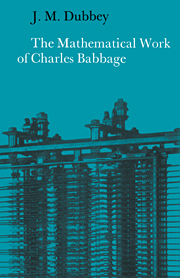Book contents
- Frontmatter
- Contents
- Preface
- 1 Introduction
- 2 British mathematics 1800–30
- 3 The Analytical Society
- 4 The calculus of functions
- 5 ‘The Philosophy of Analysis’
- 6 Miscellaneous papers in analysis, probability and geometry
- 7 Notation
- 8 Babbage and his computers
- 9 Conclusion
- Appendix: mathematical books and papers by Charles Babbage
- Index
4 - The calculus of functions
Published online by Cambridge University Press: 22 December 2009
- Frontmatter
- Contents
- Preface
- 1 Introduction
- 2 British mathematics 1800–30
- 3 The Analytical Society
- 4 The calculus of functions
- 5 ‘The Philosophy of Analysis’
- 6 Miscellaneous papers in analysis, probability and geometry
- 7 Notation
- 8 Babbage and his computers
- 9 Conclusion
- Appendix: mathematical books and papers by Charles Babbage
- Index
Summary
The calculus of functions is undoubtedly Babbage's major mathematical invention. The subject, which we will see was taken up by Babbage almost from its origin and developed by a series of ingenious generalisations, has possibilities that have been little explored even in modern mathematics. The calculus of functions is developed on lines analogous to differential equations and difference equations, but is more general than either, and can be considered as including these areas as special cases.
The major ideas are presented in two papers published in the Philosophical Transactions of 1815 and 1816. There are references in other papers which are much shorter, but the two earliest ones are by far the most significant. Both are very long papers and between them occupy 111 pages. Babbage did not develop the subject in his later years, but as he says of the calculus of functions in Passages from the Life of a Philosopher:
This was my earliest step, and is still one to which I would willingly recur if other demands on my time permitted. Many years ago I recorded, in a small MS. volume, the facts, and also extracts of letters from Herschel, Bromhead and Maule, in which I believe I have done justice to my friends if not to myself. It is very remarkable that the Analytical Engine adapts itself with singular facility to the development and numerical working out of this vast department of analysis.
The volume referred to may be found in the collection of Babbage relics contained in a cowhide trunk at the Museum of the History of Science, Oxford.
- Type
- Chapter
- Information
- The Mathematical Work of Charles Babbage , pp. 51 - 92Publisher: Cambridge University PressPrint publication year: 1978



